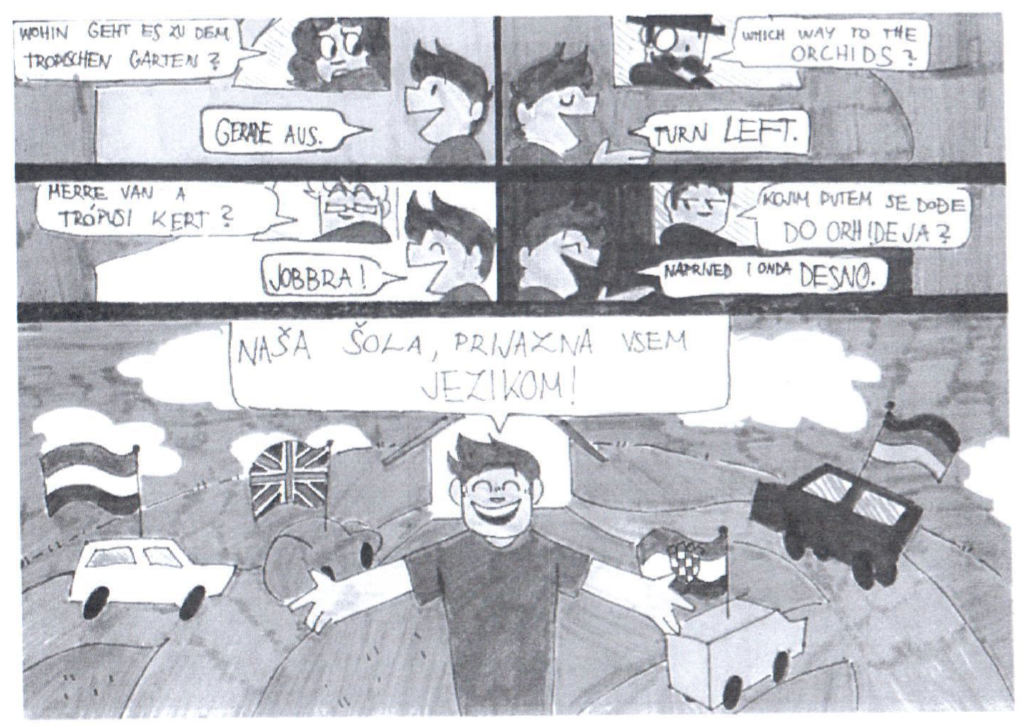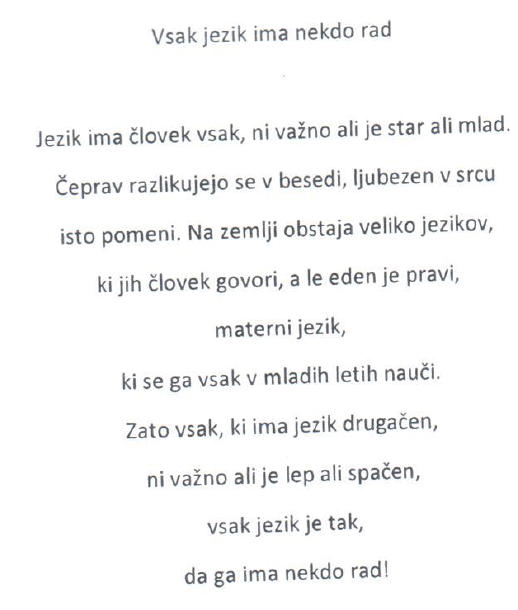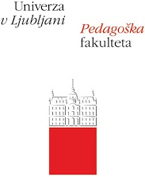More and more studies showcase the valuable effects of plurilingual practices for today’s increasingly diverse youth; from improved academic results, stimulated cognitive development, and flexible communicative skills to the more long-run democratic, economic and even health benefits.
Such findings have resulted in a variety of successful local and international European projects, one of which is also the Languages Matter project in Slovenia (2017-2022), which has been carried out at the Faculty of Education of the University of Ljubljana in parallel with the Listiac project. If the latter is aimed at developing linguistically sensitive teaching practices at the level of initial teacher education, the former aims to create supportive learning environment for the development of plurilingualism in schools. As such, it has been focusing on the development of plurilingualism at the pre-school, primary and secondary education targeting primarily young(er) learners and in-service teachers.
The Languages Matter project involves 32 partners (preschools, elementary and secondary schools, higher education institutions and research institutions) and is financed by the Ministry of Education, Science and Sport and the European Social Fund. The main goal of the project is to determine which factors support and which hinder the creation of plurilingualism-friendly educational environments and provide guidelines to help promote and develop a linguistically sensitive educational culture. A model of plurilingualism-friendly environment is currently being developed, which includes the following sub-indicators: 1) development of plurilingual competence in individuals; 2) use of effective learning approaches with the support of information-communication technologies and language resources; and 3) implementing a sustainable model for ensuring active plurilingualism of all stakeholders along the entire educational field.
All Languages in All Subjects
The project’s long-term goal is to overcome the distinction between linguistic and non-linguistic subjects by promoting plurilingualism and developing digital competences to connect different subject areas with all the languages present in the Slovenian environment. The methodology and the final outcome of Languages Matter include all languages present and recognized in the Slovenian school system, foreign and classical languages included as subjects in the curricula and all first immigrant languages. In addition, the concept is designed so broadly that it includes any new languages that could still be perceived in the project community, i.e. first languages of individuals involved in the project: teachers, parents, children, pupils and students.

Active Engagement of All Stakeholders
Several activities have been carried out at schools as part of the project. Educational institutions which participate in the project have been designing a special language pass based on certain criteria within the following categories, e.g. generally accepted views on multilingualism and interculturalism in the school; teachers’ competences; foreign/other languages; immigrant students; language(s) of instruction; school environment and materials; school management; and school cooperation with the wider community. Currently, a draft language pass is being piloted at schools in the western region of Slovenia. In September 2021, the languages pass will be implemented in all schools involved in the project. In the future, language passes will be awarded to schools that respect a selected set of criteria.
The basic guideline of the project is the greatest possible active involvement of students in the acquisition of plurilingual competencies, both in problem-based teaching that encourages critical thinking and conscious discovery of connections between languages and cultures, as well as in extracurricular activities. For example, elementary and secondary school students participated in a competition, called ‘A Language-Friendly School’, in which they engaged in various forms of expression, like creating comic strips and drawings, writing poems, stories and essays, etc. to express their own views on the importance of learning languages. Two examples of the students’ creations are shown below.

Overcoming Stereotypes And Prejudices
Languages Matter also has a cultural component. By introducing intercultural and interlingual aspects in all subjects, learners are taught to recognise and consciously accept various linguistic and cultural realities. This enables them to avoid misunderstandings in intercultural communication and develop critical cultural awareness. In addition, learners are encouraged to continuously explore the changing reality in their society and respond to it without unnecessary stereotypes and prejudices. Hence, students participating in the project have had the opportunity to get to know persons of non-Slovenian speaking communities, other races, religions and cultural traditions.
Modern Web Portal
Project partners consider the integration of ICT technology into the project’s aims as necessary in order to provide support materials to students outside of school, and to enable parents to be involved in the development of their children’s plurilingualism. Therefore, a user-friendly multimedia portal has been designed. This innovative web portal is now slowly filling up with various contents which are provided by everyone involved in the project. With this web portal, we have established a new library of materials, from lesson plans to long-term activities, through which the sustainability of the project will be ensured.
“There are no more students who are completely monolingual, we all know several languages and this can help us a great deal”, says the coordinator of Languages matter, Professor Pižorn. Numerous studies have already investigated the environment that would support the learning of different languages, but there has never been such broad support as there was for this project in the entire educational system in Slovenia.

Written by Tjaša Dražnik, Karmen Pižorn and Tina Matić
University of Ljubljana



